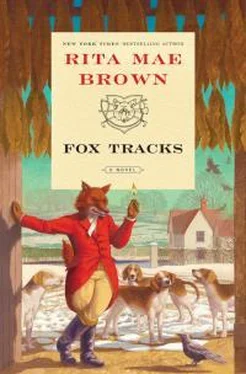“Yes. I watched the original with Tallulah Bankhead and Walter Slezak. What a powerful film.”
“I hope I’m not going to be thrown overboard.” He looked up at her as the truck was higher than his Saab.
“I don’t think so.” She smiled.
The teacher in him emerged. “Is it not an impossible problem? The sum is greater than any of its parts, which means some people must die so many can live.”
“Impossible,” Sister agreed.
Tariq frowned for a moment, then pressed on. “In my country if an elected official made a statement such as Congressman Rickman he would be being supported by the state. It would be an opening gambit to prepare public opinion for more reprisals against the person defamed.”
Sister, in a strong voice, said, “Rickman does not speak for the government although he obviously speaks for repressive elements in his district. They keep reelecting him.”
“I pray you are correct.” Tariq smiled weakly as he rolled up his window, then waved goodbye.
Sister rolled up her window. “Poor fellow. He’s having a helluva time.”
Tootie wondered aloud, “How do people like Rickman get elected?”
“Honey, that’s a long discussion for another day. I’ll give you a preview: It’s much easier to be against someone or something than for it. Quirk of our species.”
“I looked on your calendar,” said Tootie to lighten the moment. “Today it says Catherine dei Ricci. I like knowing the saints’ days—not that it has had anything to do with the board meeting or hunting.”
“Let me see, I read it this morning,” Sister mused. As the car headed up the hill, she recalled the Florentine lady. “Born in the sixteenth century and lived a good long time.”
Tootie had the dead black hair dryer in her lap, which she fiddled with. “What I don’t quite understand is why, in the calendar, do they give her name and other saints, too, and after the name, it says ‘Virgin.’ I mean, how could they know?”
“That’s a good question.” Sister laughed and so did Tootie.
CHAPTER 27
Art and Donny both grumbled that they wished they had a narrow hay elevator. Art had backed the truck into the Old Paradise barn as Donny closed the doors. The floor, packed dirt, would ruin the bottom cartons of cigarettes so they carried them up the heavy wooden ladder to the hayloft.
“Damn, when we come back for ’em, let’s throw these things down.” Art removed his heavy jacket, since he was sweating.
“Can’t do that. We’ll crush the cigarettes.” Donny stepped off the top rung.
Art passed Donny as he headed for the ladder and a trip down. “Was this my idea or yours?”
“Mine.” Donny thought he should take the blame. “But it’s a good place and there’s no reason we can’t come up with a hay elevator later. That would make this job easy. Just put the carton on, give it a push, and up she goes.”
“Used to have one,” said Art. “Like everything else on this damned farm, it broke. Christ, I hope Crawford and Dad and Alfred sign those papers soon.”
Donny just nodded as he, too, headed back down the ladder for another carton.
Although light, a man could carry but one carton at a time. He needed one hand to hang on to the ladder.
For all the huffing and puffing, the job took only an hour.
“Hand it up.” Donny, on his stomach, leaned over the top of the ladder as Art pushed up a heavy brown canvas tarp.
Four more of those and the cartons were covered. The problems weren’t the elements, but bird poop, as quite a few winged creatures inhabited the barn.
The two men put rolls of insulation in front of the tarp.
Roger, a gray fox, also used the barn, but neither man knew of or discovered his den in a back stall. No reason for them to look in the stalls. The fox was fascinated with the men’s cussing, the smell of tobacco, and the noise of feet on the ladder. Wisely, he kept his head down.
Finally, the two finished upstairs, climbed down, took some two-by-fours off the truck bed, and laid them on the floor. They leaned for a moment on a cobweb-covered stall door.
“When do we have to drive up to New Jersey?” Donny asked Art. He had contact with the boss whereas Donny did not.
“Next week.”
“Wouldn’t we get more money if we made the drops in the city?”
“We’d be sitting ducks with our Virginia license plates. It’s bad enough we drive into New Jersey or up to western Massachusetts. Takes forever using the back roads, but we can’t risk a weigh station,” Art said.
“I guess you’re right, but the weight of the tobacco is so much less than the stuff they’re really looking for at those stations.”
“Can’t take the chance,” Art said. “This is a good gig. Besides, there’s always a state trooper at those stations.”
“Fat, too.” Donny laughed.
“Do you know some states are setting weight rules for cops? Bet the gym owners are glad about that.”
Donny smiled. “Bet the troopers’ wives are, too. Man, can you imagine having some three-hundred-pound guy smashing on top of you?”
Art shot him a dirty look. “No. Why, can you?”
“Oh, sure.” Donny grinned as a little part of him enjoyed setting off Art, a man of limited imagination.
“Perv.”
Donny changed the subject back. “Have you ever seen the trucks that smuggle the stuff into the city?”
“Once when Carter drove with me up to Massachusetts, three vans—plumbing company logo painted on them—off-loaded straight from my truck. These guys are pros. Any city we go to, I mean the actual delivery men, they don’t just deliver smokes, they drop off ’shine, probably weed, and some of the trucks are outfitted so guys can actually cook meth on the road.”
“That shit is nine miles of bad road.” Donny looked up at the roof beams, hand-hewn and tremendously thick. “Would have liked to see this barn getting built.”
“1816. Used saw pits and muscle power. Works as good as anything we do today, it’s just slower.”
“Yeah, but would you want to be the guy on the other end of the saw down in the pit?” Donny laughed.
Art laughed, too. “Guess not, but I wonder if those men had fewer injuries than today. You pushed and pulled the saw, the speed was as fast as you could go. I mean, if you take your eye off a saw today—even a band saw—no fingers!”
“Yep. Well, buddy, when do you want me back here?”
“Tuesday or Wednesday next week, but I’ll text you.”
“Okay. Ready to push off?”
Art drove the truck out; Donny closed the massive doors behind him. The minute the humans left the barn, Roger popped out of his den, climbed the ladder, a piece of cake for a gray fox, trotted across the hayloft to the canvas-covered cartons.
Sniffing around, he sneezed. “Whoo.”
“It’s who.” The barn owl called down to him.
“ Have you gotten a whiff of this stuff? ” Roger asked the bird.
The barn owl glided down to a crossbeam above him. As she, too, was a predator, she thought the better of landing too close to the lightning-fast fox. Not that Roger had ever disturbed the bird, but why take the chance?
“The smell is sweet.” The barn owl widened her eyes. “But there’s a tang there. I smell smoke, too, can you?”
“Some of the old outbuildings around here and on close-by farms have this smell,” said Roger.
“ ’Bacca sheds. Curing sheds.” The owl volunteered this information. “I’ve overheard people calling them that. Alfred DuCharme had an old Irish Setter—really old—and he said he remembered the last time one of those sheds was used. That was a good dog.”
“Ah, this is the stuff I see them stick in their mouths and puff, you know, when one passes in a car with the windows down. It’s a human ritual I can’t figure out.”
Читать дальше












